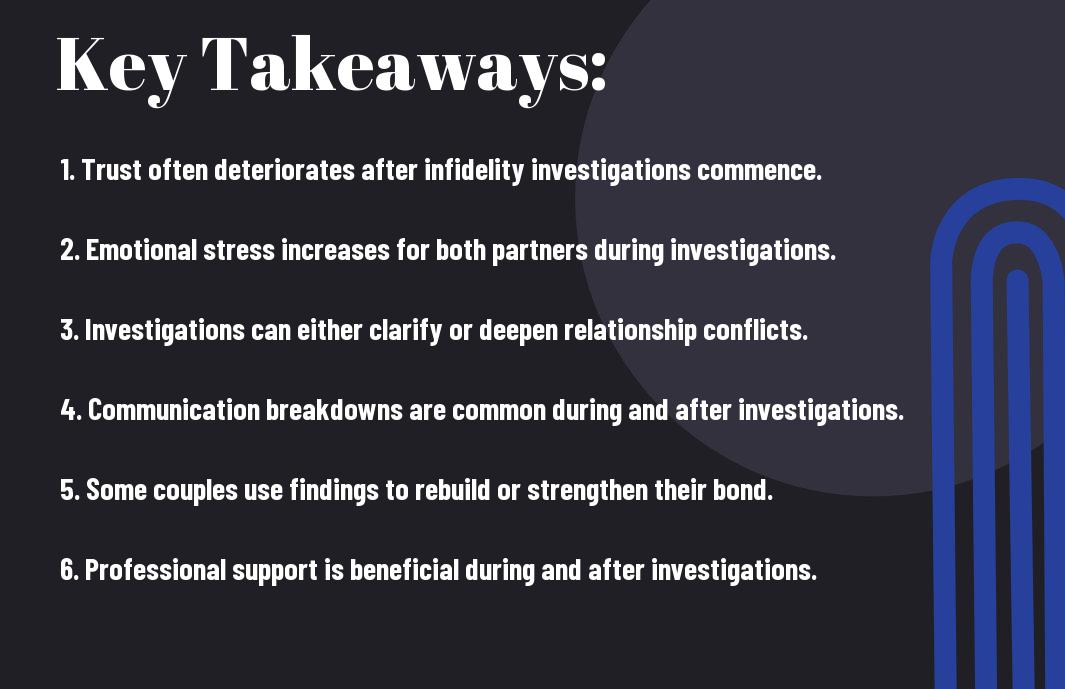There’s an undeniable weight that comes with conducting infidelity investigations in your relationship. Delving into suspicions of betrayal can lead to significant psychological effects that not only impact you, but also your partner and the overall connection you share. In this post, we explore seven key aspects of how these investigations influence your mental and emotional well-being, helping you understand the nuances of this distressing situation. By recognizing these impacts, you can make informed decisions about your relationship and your own mental health moving forward. Let Digital Forensic Squad be your partner for your infidelity investigations to give you a peace of mind.
Key Takeaways:
- The act of investigating infidelity can create significant emotional stress for both partners, often leading to feelings of betrayal and mistrust even before any findings are revealed.
- Open communication and transparency during the investigation process can help mitigate the psychological impact, fostering a sense of security and understanding between partners.
- The outcome of an infidelity investigation—whether confirming or denying suspicions—can fundamentally change the dynamics of the relationship, often requiring ongoing dialogue and support to rebuild trust.
Understanding Infidelity
To navigate the complex issue of infidelity, it’s vital to comprehend its underlying definitions and types. Infidelity can have far-reaching effects on relationships, leading to deep emotional wounds and long-lasting consequences. By understanding the nuances of infidelity, you can better assess its impact on your relationship and take appropriate steps towards resolution or healing.
Definition of Infidelity
One common definition of infidelity involves a breach of trust or commitment within a romantic relationship, typically manifesting as emotional or physical betrayal. This breach can include various forms of secrecy or deception, which can significantly undermine the foundational trust that relationships are built upon.
Types of Infidelity
When discussing the various forms of infidelity, it’s crucial to identify the major types that may affect relationships:
- Emotional Infidelity
- Physical Infidelity
- Cyber Infidelity
- Financial Infidelity
- Micro-cheating
This classification can help you recognize the diversity of infidelity and how it may manifest in your own relationship.
| Type of Infidelity | Description |
|---|---|
| Emotional Infidelity | Forming a deep emotional connection with someone outside of the relationship. |
| Physical Infidelity | Engaging in sexual activities with someone other than your partner. |
| Cyber Infidelity | Using online platforms to engage in romantic or sexual interactions. |
| Financial Infidelity | Keeping financial secrets or engaging in financial deception. |
| Micro-cheating | Small, seemingly innocent actions that may betray a partner’s trust. |
With this knowledge in mind, it’s important to explore the specific dynamics within infidelity types. Each type carries its emotional weight and impacts your relationships differently. Understanding these distinctions can empower you to have more open and honest conversations about these difficult topics:
- Emotional infidelity often leads to feelings of neglect.
- Physical infidelity can provoke intense jealousy and anger.
- Cyber infidelity can be challenging to detect but deeply damaging.
- Financial infidelity can create mistrust regarding long-term stability.
- Micro-cheating can undermine feelings of security in your relationship.
This deeper understanding may illuminate potential vulnerabilities in your relationship and help you foster a stronger, healthier bond.
| Consideration | Implications for Your Relationship |
|---|---|
| Understanding Emotional Infidelity | Identify feelings of disconnection. |
| Acknowledging Physical Infidelity | Recognize the manifestation of betrayal. |
| Exploring Cyber Infidelity | Ensure transparency with online interactions. |
| Addressing Financial Infidelity | Discuss financial decisions openly. |
| Rethinking Micro-cheating | Evaluate boundaries in your relationship. |

The Role of Investigations in Infidelity
Clearly, investigations serve as a critical tool for individuals seeking clarity in their relationships. When suspicions of infidelity arise, the need for concrete evidence often outweighs the desire for trust or open communication. Engaging in thorough investigations can either confirm your fears or offer reassurance that your relationship may be stronger than you thought. Understanding this role can help you navigate the complex emotions that accompany infidelity concerns.
Methods of Investigation
About the methods of investigation, there are various approaches you can take to uncover the truth about your partner’s fidelity. Surveillance, social media monitoring, and direct inquiries can all provide insights. Each method has its own set of implications and ethical considerations, which should weigh heavily on your decision-making process as you seek answers.
Emotional Triggers for Investigation
For many, the decision to investigate stems from emotional triggers that heighten your suspicions of infidelity. Anxiety, jealousy, and past experiences can all lead to a heightened sense of distrust in your relationship. It’s necessary to recognize these feelings as signals that may indicate a deeper issue that requires your attention.
Investigation often emerges from these emotional triggers as a way to reclaim control over a situation that feels uncertain and precarious. Your instinctive need for answers can drive you to act impulsively, leading to further emotional turmoil. Rather than jumping to conclusions, acknowledging these feelings allows you to evaluate the reasoning behind your investigative journey and make more grounded choices as you seek resolution, clarity, or closure.
Psychological Impact on the Partner Conducting the Investigation
Unlike the partner being investigated, you may experience a unique and intense psychological burden as the investigator. The weight of suspicion and uncertainty can cloud your judgment and lead to heightened emotional distress. This often manifests as an internal conflict where you grapple with your commitment to your partner and the instinctive drive to uncover the truth, ultimately impacting your mental wellbeing.
Anxiety and Suspicion
Any effort to investigate your partner can generate overwhelming feelings of anxiety and suspicion. You may find yourself constantly questioning their actions, interpreting innocent gestures as signs of betrayal, and becoming preoccupied with thoughts of what your findings may reveal. This can create a toxic atmosphere not only within yourself but in your relationship as well.
Guilt and Moral Dilemma
At some point, you may confront feelings of guilt and a moral dilemma about the investigation itself. The act of probing into your partner’s life can lead to uncomfortable internal conflicts regarding trust and betrayal, compelling you to question your own motivations and ethics in the relationship.
Indeed, this guilt can morph into a heavy burden, where you grapple with the consequences of your actions. You may find yourself torn between wanting to preserve your relationship—and potentially discovering infidelity—and the ethical implications of invading your partner’s privacy. This unease can linger, leading to lowered self-esteem and feelings of inadequacy, further complicating your emotional state and the relational dynamic with your partner.
Psychological Impact on the Partner Being Investigated
For many, undergoing an infidelity investigation can be profoundly unsettling. You may experience a whirlwind of emotions, including anxiety and guilt, as you navigate the scrutiny of your behavior and the foundation of trust in your relationship. This psychological distress can often lead to a sense of isolation, making it crucial to address the emotional aftermath for both you and your partner.
Trust Issues
Partner investigations often leave you grappling with deep-seated trust issues. You may question your partner’s loyalty, as well as your own judgment in the relationship. This can create a lingering distrust that complicates even mundane interactions, making it challenging to rebuild the connection you once shared.
Fear of Exposure
Below the surface, you might find yourself plagued with a persistent fear of exposure. This fear can stem from the anxiety of being perceived as untrustworthy or being confronted with the possibility of your secrets coming to light.
Understanding the weight of fear associated with being investigated is crucial. This fear not only compromises your self-esteem but can also lead to defensive behaviors that further alienate you from your partner. Acknowledging these feelings is a vital step toward fostering open communication, which is key in overcoming the emotional turmoil that an infidelity investigation can provoke.
Impact on the Relationship Dynamics
Once again, the psychological ramifications of conducting infidelity investigations can significantly alter the dynamics within a relationship. Trust, once shattered, can lead to persistent tension and resentment, affecting how partners interact with each other. You may find that your relationship becomes a battleground of suspicion and unease, making it challenging to navigate day-to-day interactions or emotional connections. The lingering effects of doubt can reshape your bond, leaving both partners feeling isolated or defensive.
Communication Breakdown
Across the spectrum of relationship dynamics, communication often suffers due to the stress and anxiety linked to infidelity investigations. You may feel hesitant to address your feelings or concerns, fearing confrontation or further emotional distress. As a result, important conversations may be stifled, leading to misunderstandings and further alienation. The inability to communicate openly can create a barrier that makes it difficult to restore trust and intimacy.
Shifts in Power and Control
An infidelity investigation can lead to significant shifts in power and control within your relationship. As suspicion arises and trust deteriorates, one partner may start monopolizing the decision-making process, responding to feelings of insecurity with a need to assert control. You might find yourself either withdrawing or becoming overly vigilant, both of which can disrupt the balance of power. This shift can exacerbate conflict and resentment, making it necessary to recognize and address these changes for recovery.
Communication is key in addressing power imbalances that may emerge following an infidelity investigation. By openly discussing feelings, boundaries, and expectations, you can begin to identify any unhealthy dynamics that have developed. Recognizing how control manifests in your relationship will allow you to regain a sense of balance. Building a foundation of mutual respect and understanding will help both partners feel heard and valued, which is vital for moving forward in a healthier way.

Coping Mechanisms and Support
Many individuals facing the aftermath of infidelity find it necessary to develop coping mechanisms and seek support from their network. Engaging with friends and family who can listen without judgment is vital in processing emotions. You may also benefit from practices like mindfulness or journaling, which can help clarify your feelings and provide insight. Overall, fostering a supportive environment plays a significant role in navigating through such challenging times.
Professional Help
Among the best steps you can take for emotional recovery is seeking professional help. Therapy or counseling can provide a safe space for you to explore your feelings, gain perspectives, and develop coping strategies. A trained therapist can facilitate open discussions, guiding you toward better emotional health and relationship dynamics.
Building Trust and Healing
An necessary aspect of overcoming infidelity involves actively working on rebuilding trust and healing within the relationship. This process requires open communication, transparency, and a willingness to understand each other’s perspectives. It’s beneficial to establish ground rules and commitments that address the core issues that led to the breach of trust.
Hence, as you launch on the journey of building trust and healing, it is important to openly discuss feelings, fears, and expectations. Reassurance from both partners will form the foundation of trust, creating opportunities for forgiveness and emotional reconnection. Engage in activities that foster bonding and understanding, and establish a shared commitment to growth. By prioritizing honest dialogue and mutual accountability, you can cultivate a healthier relationship that emerges stronger from the challenges faced.
Conclusion
On the whole, understanding the psychological impact of conducting infidelity investigations on relationships can help you navigate the complexities of trust and communication. Engaging in these investigations can evoke various emotions, leading to potential breakthroughs or further complications in your relationship. By being aware of the underlying psychological effects, you can approach the situation with sensitivity and intentionality, ultimately fostering an environment where both partners feel heard, valued, and capable of addressing their issues together. Therefore it is always better to entrust your investigations to professionals like Digital Forensic Squad so provide you with legal, actionable intelligence on your relationship.
FAQ
Q: How can conducting infidelity investigations affect trust in a relationship?
A: In relationships, trust is a fundamental component that holds partners together. When one partner suspects infidelity and seeks to investigate, the act itself can create a sense of betrayal even before any evidence is uncovered. The partner being investigated may feel hurt or disrespected by the lack of trust, leading to conflicts or resentment. If the investigation confirms infidelity, it can be devastating, resulting in feelings of abandonment and insecurity. Conversely, if the investigation reveals that the suspicions were unfounded, it may take considerable time and effort to rebuild trust, as the investigated partner may feel the investigation was unjustified.
Q: Can the outcome of an infidelity investigation lead to relationship growth?
A: While infidelity can cause significant strain, the outcome of an investigation can lead to opportunities for growth if both partners choose to engage in open communication and healing. If infidelity is confirmed, it might prompt honest discussions about unmet needs, boundaries, and the overall direction of the relationship. Couples counseling may serve as a beneficial avenue for partners to explore their feelings and work through the aftermath together, fostering a stronger bond if both are committed to the process. Alternatively, if the investigation shows no infidelity, it can lead to an important conversation about trust and communication, enabling both partners to lay a stronger foundation moving forward.


